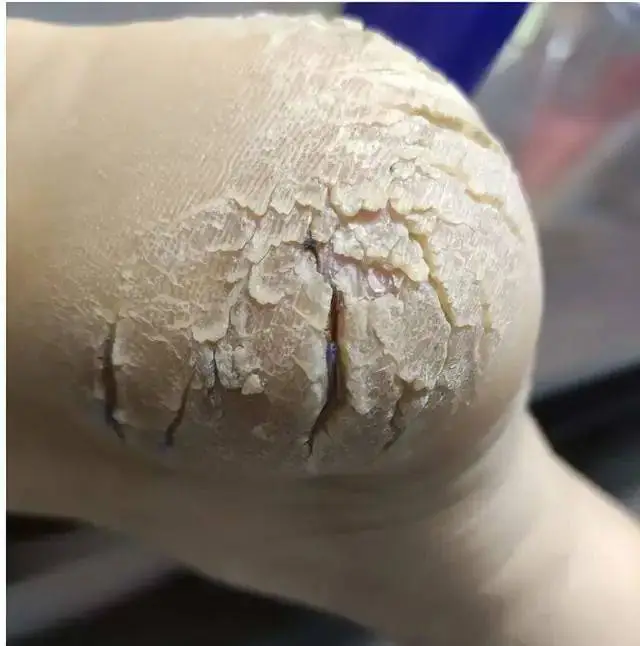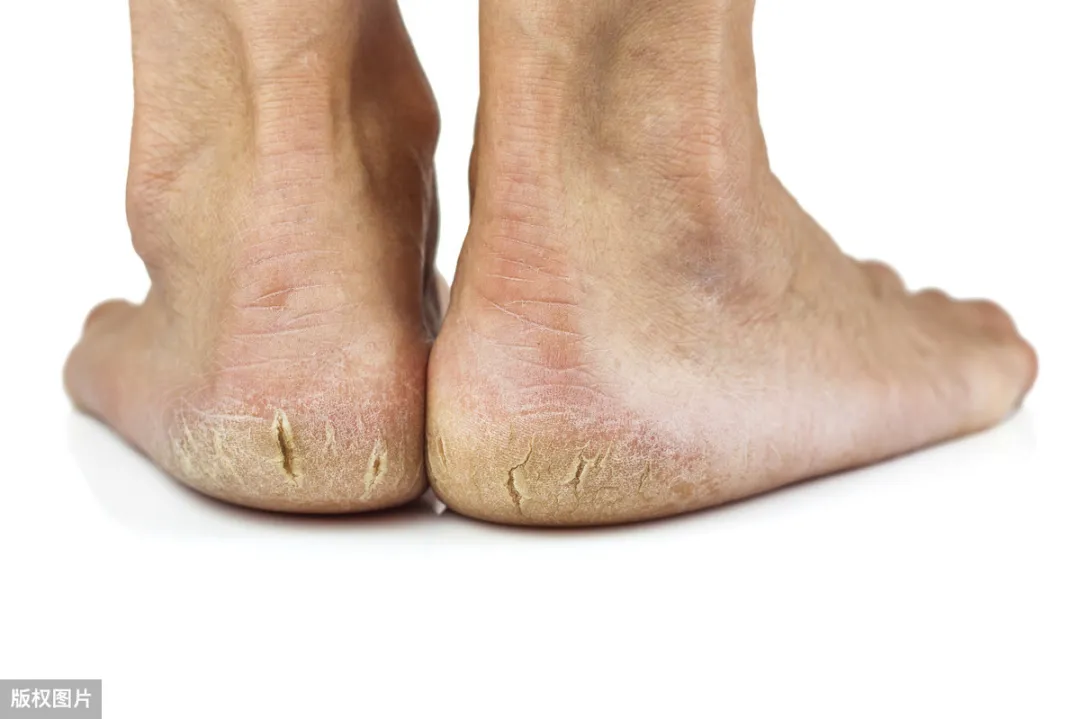[Micro Popular Science] Chapped hands and feet in the elderly
At the beginning of the cold winter, many elderly people's fingertips and heels began to appear a deep crack, a touch of blood, serious and even painful can not walk. Why does the skin crack, and how can you make it smaller and disappear?

In fact, this is a skin disease, called elderly hands and feet chapped, refers to the elderly hands and feet skin due to various reasons, dry, cracked phenomenon. It is often manifested as rough and thickened skin, and cracks of varying depth and length appear in the palms, soles, heels, fingers, toes and other parts. Mild skin is only dry, there are superficial small cracks, may be accompanied by slight pain or itching; The cracks can reach deep into the dermis, and even cause bleeding, and the pain is more severe, seriously affecting daily life and activities.
Why do you have chapped hands and feet in old age?
First of all, it is because of water loss. With the growth of age, the sebaceous glands and sweat glands of the skin of the elderly gradually decline, and the oil and sweat secreted by the skin decrease, making the skin lack of adequate water retention, thus becoming dry. Secondly, it is also related to the climate, in the cold and dry winter, especially in the air-conditioned room, the water loss is intensified, and the skin on the hands and feet is more likely to appear chapped. There is also the fact that the elderly may often come into contact with some chemicals in their daily lives, such as cleaners and detergents. These chemicals have a certain irritant, will destroy the lipid layer on the surface of the skin, so that the skin's barrier function is damaged, resulting in accelerated water loss, increasing the risk of chapped hands and feet. Some elderly people may pay too much attention to hygiene, frequent hand washing and foot washing, which will also cause irritation to the skin, resulting in dry and chapped skin on the hands and feet. Many elderly people do not develop good skin moisturizing habits, do not often use moisturizing skin care products. The lack of adequate moisture on the hands and feet skin, in a dry environment is prone to chapping.
What is the harm of chapped hands and feet to the elderly?
Pain: The cracks caused by chapped hands and feet will directly expose the nerve endings of the dermis, and when subjected to external stimulation, such as walking and hand activities, it will cause severe pain. This makes the elderly very limited in their daily activities. Infection: A chapped wound provides a channel for the invasion of microorganisms such as bacteria and fungi. If you do not pay attention to cleaning and care, it is easy to cause infection.
How to prevent chapped hands and feet in old age?
First of all, moderate cleaning, reduce the frequency of washing hands and feet, avoid the use of overheated water and strong alkaline soap. Secondly, moisturize and develop the habit of using moisturizing skin care products regularly. Choose hand and foot creams that contain moisturizing ingredients such as petroleum jelly, glycerin, and urea, and apply them several times a day, especially after washing your hands and feet and before going to bed. For areas that have developed chapping, you can wrap them with plastic wrap or disposable gloves after applying moisturizer to enhance the moisturizing effect and promote skin repair. When doing housework or other activities, try to wear gloves and avoid direct contact with chemicals and rough objects. For example, wear rubber gloves when washing dishes and clothes, and wear cotton gloves when moving things. At the same time, pay attention to maintain the appropriate indoor humidity, ensure that the intake of adequate water and vitamin A, vitamin E, vitamin C and high-quality protein food. Drinking more water can replenish the water needed by the body and maintain the normal metabolism of the skin. Exercise moderately.
How can existing tears be treated?
When the hands and feet are not too serious, they can be soaked in warm water for 15-20 minutes each time, 1-2 times a day. After soaking, gently dry your hands and feet with a soft towel, then use a gentle exfoliator to gently remove dead skin from your hands and feet. After removing the dead skin, apply moisturizing skin care products or medicines to better work. If the condition is more serious, it should be timely to the regular hospital dermatology treatment, actively diagnosed and standardized treatment under the guidance of doctors. Common treatments include topical and oral medications. Topical drugs: 1. Moisturizers: such as petroleum jelly, glycerin, etc., can form a protective film on the skin surface to prevent water loss and promote skin self-repair. Applying it several times a day, especially before going to bed, can effectively improve dry skin. 2. Keratolytic agents: For thicker cuticle, salicylic acid, urea and other keratolytic agents can be used. They can soften the keratin, promote the loss of the cuticle, and make the skin smooth. 3. Compound preparations: Some compound preparations containing a variety of ingredients, such as compound benzoic acid ointment, urea vitamin E cream, etc., have the role of moisturizing, softening cutin and promoting skin repair. The appropriate compound preparation can be selected for treatment according to the condition. 4. Glucocorticoid: When chapping is accompanied by inflammation and itching is obvious, glucocorticoid ointment, such as hydrocortisone ointment, can be used for a short time. Generally used for no more than 2 weeks, apply 1-2 times a day. Oral medications: If chapped hands and feet are severe, accompanied by dry skin all over the body or other systemic diseases, some oral medications may be required. For example, vitamin A, vitamin E, etc., can improve the nutritional status of the skin and promote skin repair. But oral medications need to be taken under the guidance of a doctor to ensure they are safe and effective. Although the elderly chapped hands and feet is a common skin problem, but through the correct prevention and treatment measures, can effectively reduce the symptoms and improve the quality of life of the elderly. The elderly and their families should pay attention to the care of the skin of their hands and feet, develop good living habits, timely find and deal with the problem of chapped hands and feet, so that the life of the elderly is more comfortable and healthy.

Li Weiran, Young member of the Dermatology Branch of Chinese Geriatric Society, the First Affiliated Hospital of Anhui Medical University
(The opinions expressed are solely those of the author. Some pictures in this article are from the Internet, if there is infringement, contact delete)

